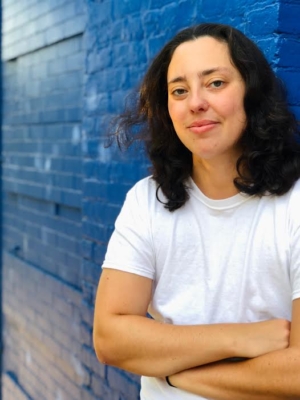June/ My iPhone Died Three Years Ago and I’m Still Not Over It
[creative non-fiction]
June
If there’s blood, I don’t feel it.
Something called providone-iodine does the trick. Google names the reactions oxidizing and chemocauterizing, prompts continuous Google searches until I near satisfaction. All I know is I got a C in high school chemistry and worked fucking hard for it.
All I know is that snipped skin sounds like construction paper snowflakes in summer.
Sometimes Pride means discarding yourself, the excess, becoming pink and raw again and again. I admit to my surgeon I’m still scared of my nipples falling off and she laughs. What I’m really scared of is ineptitude and its illusions.
I tell the surgeon about my partner’s job and the erosion of work-life boundaries, about bingeing Drag Race seasons backwards, about protests, this movement. These stitches will dissolve but my body will remain a monument indebted to ancestry.
Marsha. Sylvia. Stormé. Pauli. Leslie.
If there’s blood, I only feel it when air echoes and electrifies with Black Trans Power, marching in white with the love of my life, queering Fort Greene Park with revolution.
The surgeon peels off my skin and the next layer of flesh takes a much-needed breath—cool like bay water at sunset, tides skimming soles, the promise of another day.
My iPhone Died Three Years Ago and I’m Still Not Over It
When you find a Polaroid of your dying grandmother, should it go back in the hallway drawer with last year’s birthday cards, or into your wallet? Can leather shelter the dead? Safekeep ashes of past-life?
Remember when you carried the detective’s business card in your wallet, sandwiched between an expired LIRR ticket and a middle school photo of your little cousin, the comic book word bubble backdrop collaged with BOOMs WHACKs ZAPs? It felt sinister holding her face against truth, a one-in-six omen. Did you know justice is 3.5” x 2” beige cardstock warmed in back pockets, passed through fingertips and forgotten?
When your iPhone died, the evidence died with it. Screenshots of text exchanges between you and his buddy, you and him.
What did he do now?
Remember that one meeting at the station? Those three hours of silence? Escorted by the detective, descending to exit, when he finally texts:
Hey, what you want to talk about?
The stairwell turned catacomb.
You told him: My grandmother is in the hospital. Can we talk another time?
You resented being intimate with your rapist.
Remember when you named your assault rape, the way it burned like acid to the core, revelation turned rupture? The detective taught you how to record phone calls, just in case. You never did but came close when you ran into him at the megachurch-sized UFC gym as your friend’s guest. You side-hugged him hello instead. No words worth replaying, but maybe someday.
When your iPhone died, the video died with it—the one where you reveal, Tr*mp won, and your grandma, wide-eyed, Romanian thickened throat, moans:
What, unbelievable! in a way that reminds you of Lola Caricola from CatDog.
Despondence turned laughter.
So, where should that go, now that it’s gone?
Annette Covrigaru is a gay, bigender American-Israeli writer and photographer. They’ve been awarded a Lambda Literary Emerging LGBTQ Voices Nonfiction Fellowship and have been nominated for a Pushcart Prize. Their poetry, nonfiction, and essays have appeared in Peach Mag, Yes, Poetry, and Hey Alma, among others, and are collected at annettecovrigaru.com. Annette’s debut chapbook, Reality In Bloom, is forthcoming with Ursus Americanus Press. They live and roller skate in Brooklyn.





